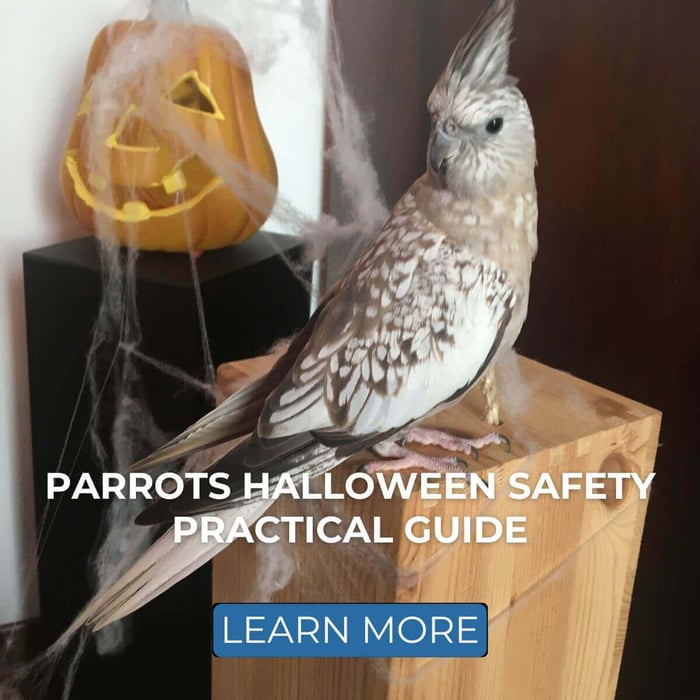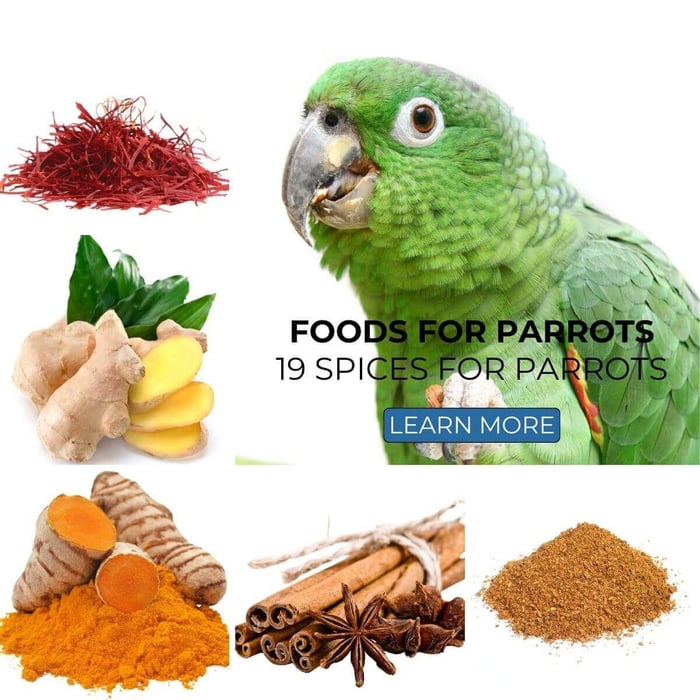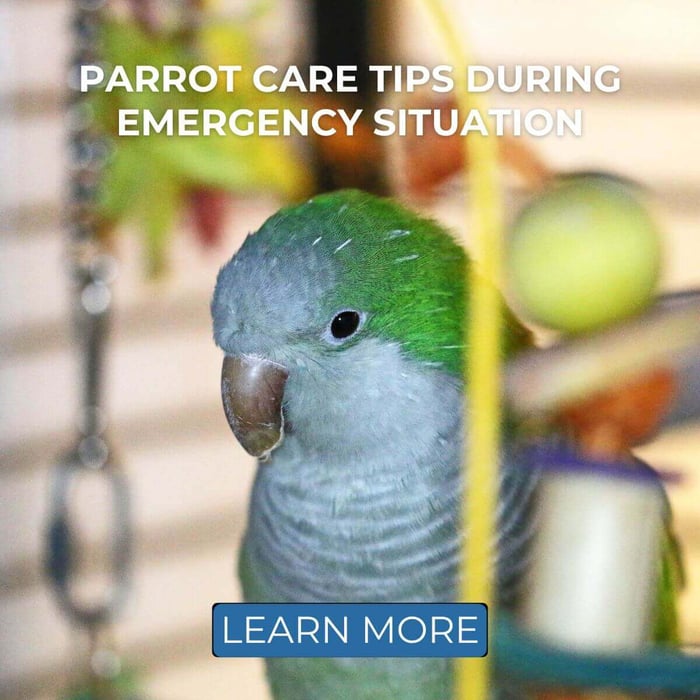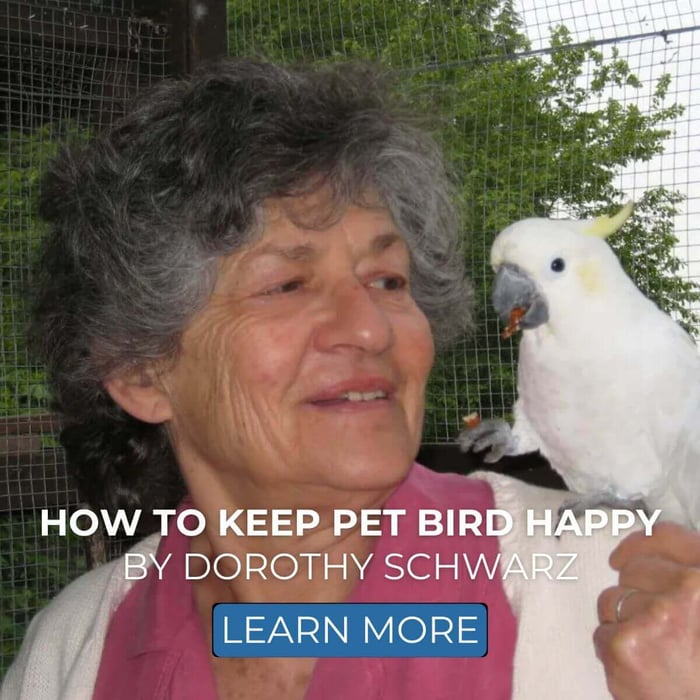Enrichment Food for Parrots: 36 Herbs for Parrots
As parrot owners, we’re always looking for ways to enrich our birds’ daily routine and diet. Variety is the spice of life, after all, and this applies to our feathered friends just as much as it does to us. Did you know there are a plethora of herbs commonly used in cooking that your parrot can safely eat? Introducing herbs into your parrot's diet can be a delightful way to provide not only variety but also additional health benefits. In this post, we’ll explore 36 herbs for parrots and clarify which ones are safe for your avian companion.
The Benefits of Herbs for Parrots
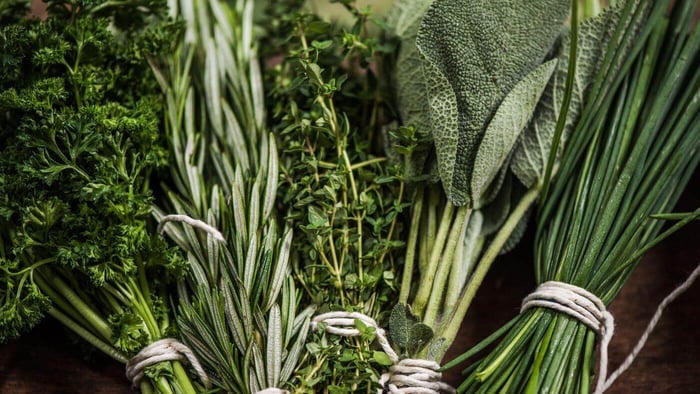
Incorporating herbs into your parrot's diet can offer numerous benefits:
- Nutritional Boost: Many herbs are packed with vitamins, minerals, and antioxidants that can help support your parrot's overall health.
- Digestive Health: Some herbs can aid digestion and help with common digestive issues that parrots may experience.
- Immune Support: Certain herbs contain properties that can bolster your parrot's immune system, helping them fend off illnesses.
- Mental Stimulation: The introduction of new tastes and textures can provide mental stimulation, keeping your parrot engaged and curious.
- Natural Remedies: Many herbs have medicinal properties that can benefit your parrot, provided they are used wisely and in moderation.
Safe and Unsafe Herbs for Parrots
When considering herbs for your parrot, it’s essential to know which ones are safe and which to avoid. Here’s a comprehensive list:
| Name | Is it safe for parrots? |
| Anise (Pimpinella anisum) | Yes |
| Basil (Ocimum basilicum) | Yes |
| Laurel (bay leaf; Laurus nobilis) | Yes |
| Bayberry (genus Myrica) | Yes |
| Bee balm (genus Monarda) | Yes |
| Borage* (Borago officinalis) | Likely yes |
| Calendula (genus Calendula) | Yes |
| Caraway (Carum carvi) | Seeds yes; flowers likely yes |
| Catnip (Nepeta cataria) | Not sure |
| Celery leaves (Apium graveolens) | Yes |
| Chamomile (Matricaria recutita & Anthemis nobilis) | Yes, as a tea or the flowers |
| Chervil (Anthriscus cerefolium) | Yes |
| Chives (Allium schoenoprasum) | No |
| Coriander (Cilantro; Coriandrum sativum) | Yes |
| Dandelion (genus Taraxacum) | Yes |
| Dill (Anethum graveolens) | Yes |
| Echinacea (genus Echinacea) | Likely yes, at least the dried form |
| Fennel (Foeniculum vulgare) | Yes |
| Feverfew (Tanacetum parthenium) | Not sure |
| Garlic (Allium sativum) | No |
| Ginger (Zingiber officinale) | Yes |
| Ginseng (Panax ginseng) | Not sure |
| Hibiscus (genus hibiscus) | Yes |
| Holy basil (Ocimum tenuiflorum) | Yes |
| Horseradish (Armoracia rusticana) | Yes |
| Lavender (genus Lavandula) | Yes |
| Lemonbalm (Melissa officinalis) | Yes |
| Lemon verbena (Aloysia citrodora) | Not sure |
| Lemongrass (Cymbopogon citratus) | Yes |
| Liquorice root (Glycyrrhiza glabra) | No |
| Marjoram (Origanum majorana) | Yes |
| Milk thistle (Silybum marianum) | Use extract or seed |
| Mint (genus Mentha) | Yes |
| Mugwort (Artemisia vulgaris) | Yes |
| Nasturtium (watercress; genus Tropaeolum) | Yes |
| Nettle leaf (Urtica dioica) | Yes |
| Oregano (Origanum vulgare) | Yes |
| Parsley (Petroselinum crispum) | Yes |
| Peppermint (Mentha × piperita) | Yes |
| Rosemary (Salvia rosmarinus) | Yes |
| Saffron (Crocus sativus) | Probably yes |
| Sage (Salvia officinalis) | Yes |
| Sorrel (genus Rumex) | Sources vary |
| St. John's wort (Hypericum perforatum) | Yes |
| Stevia (Stevia rebaudiana) | Yes |
| Tarragon (Artemisia dracunculus) | Yes |
| Thyme (genus Thymus) | Yes |
| Valerian (Valeriana officinalis) | Discuss with your veterinarian |
| Witch hazel (Hamamelis virginiana) | Not sure, topically yes |
| Wormwood (Artemisia absinthium) | No |
| Yarrow (Achillea millefolium) | Flowers likely yes |
Note: There is discussion about borage because it contains pyrrolizidine alkaloids. Borage seed oil should not be used, but feeding a flower here and there shouldn’t do any harm.
Considerations When Feeding Herbs to Parrots
- Moderation is Key: While many herbs are safe for parrots, it’s essential to avoid overdoing it. A sprig here and there is fine, but large quantities of certain herbs can lead to digestive issues. Herbs like rosemary, thyme, and mint, which contain high doses of essential oils, can upset a bird's stomach if consumed in excess.
- Potential Medicinal Effects: Some herbs have active properties that may affect your parrot's health. For example, milk thistle is known for its liver-supporting properties, while valerian acts as a strong sedative. Always consult with your veterinarian before introducing new herbs with medicinal properties.
- Pesticide-Free Options: Ensure any herbs you use are free from pesticides or pollutants. Growing your own herbs or purchasing those certified for human consumption is always best. Avoid foraging from roadsides or unknown areas where chemicals may be present.
36 Herbs for Parrots: A Closer Look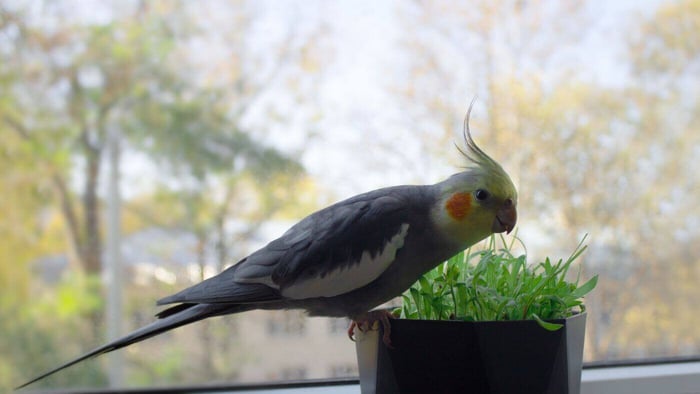
To help you explore the world of herbs further, here’s a detailed look at some of the herbs for parrots listed above:
- Anise: Known for its sweet, aromatic flavour, anise can be offered fresh or dried. It may help with digestion.
- Basil: A common culinary herb, basil is rich in antioxidants and can help support your parrot’s immune system.
- Chamomile: Chamomile flowers can be given as tea or directly to your bird. It’s known for its calming properties, which can be beneficial for stressed birds.
- Dandelion: This common weed is a nutritional powerhouse! The leaves and flowers are safe and can provide essential vitamins and minerals.
- Mint: Parrots often enjoy the refreshing taste of mint. It can also aid digestion and add variety to their diet.
- Nettle Leaf: Packed with nutrients, nettle leaf can be beneficial for your parrot’s health. Ensure it's well-prepared, as fresh nettle can sting.
- Rosemary: This herb can enhance cognitive function in birds. Use it sparingly to avoid digestive upset.
- Thyme: Thyme is not only a flavorful herb but can also have antimicrobial properties. A little goes a long way.
- Sage: Known for its anti-inflammatory properties, sage can support overall health when given in moderation.
- Lemon Balm: This herb has a pleasant aroma and is known to have calming effects, making it an excellent choice for anxious birds.
Don’t Forget…
When introducing new herbs, keep in mind that most parrots prefer fresh options. While dried herbs are safe, fresh herbs can provide more nutrients and moisture. Always wash herbs thoroughly before offering them to your bird to remove any residue.
Conclusion
Parrots can enjoy a diverse array of herbs in both fresh and dried forms. However, it’s crucial to do your research and gradually introduce new items into their diet. Remember to monitor how your bird responds to new herbs and consult your veterinarian if you have any concerns.
Have you tried any of these herbs for parrots? Do you have additional herbs to suggest? We love hearing from our readers, so be sure to leave a comment below!
Want to know more about parrot diets? Check out our range of informative articles on parrot care: https://parrotessentials.co.uk/blog/category/parrot-care

